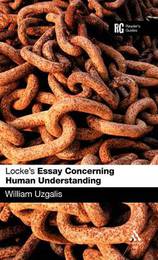
|
Locke's 'Essay Concerning Human Understanding': A Reader's Guide
Hardback
Main Details
| Title |
Locke's 'Essay Concerning Human Understanding': A Reader's Guide
|
| Authors and Contributors |
By (author) Professor William Uzgalis
|
| Series | Reader's Guides |
|---|
| Physical Properties |
| Format:Hardback | | Pages:148 | | Dimensions(mm): Height 216,Width 138 |
|
| Category/Genre | Philosophy - epistemology and theory of knowledge |
|---|
| ISBN/Barcode |
9780826490322
|
| Classifications | Dewey:121 |
|---|
| Audience | |
|---|
|
Publishing Details |
| Publisher |
Bloomsbury Publishing PLC
|
| Imprint |
Continuum International Publishing Group Ltd.
|
| Publication Date |
9 April 2007 |
| Publication Country |
United Kingdom
|
Description
Continuum's Reader's Guides are clear, concise and accessible introductions to classic works of philosophy. Each book explores the major themes, historical and philosophical context and key passages of a major philosophical text, guiding the reader toward a thorough understanding of often demanding material. Ideal for undergraduate students, the guides provide an essential resource for anyone who needs to get to grips with a philosophical text. John Locke's Essay Concerning Human Understanding is a classic text, which laid out the basic principles of the Empiricism that was to characterise British Philosophy for centuries to come.This is a hugely important and exciting, yet challenging, piece of philosophical writing. In Locke's Essay Concerning Human Understanding: A Reader's Guide, Bill Uzgalis explains the philosophical background against which the book was written and the key themes inherent in the text. The book then guides the reader to a clear understanding of the text as a whole, before exploring the reception and influence of this classic philosophical work. This is the ideal companion to study of this most influential and challenging of texts.
Author Biography
Bill Uzgalis is Associate Professor in the Department of Philosophy at Oregon State University. He holds a Philosophy PhD from Stanford. He is the author of numerous articles on Locke, including the Locke entry in the Stanford Encyclopedia of Philosophy.
|